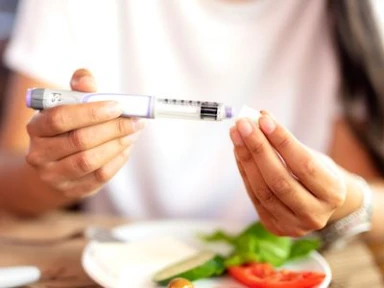A narrative review for clinicians on insulin management for Type 2 Diabetes during Ramadan
-(1).jpg7/jcr:content/science%20hero%20(2)%20(1).jpg)
Key takeaway
This narrative literature review exploring the insulin subtypes likely to prevent hypoglycemia and reduce hyperglycemia in patients with insulin dependent T2D when fasting during Ramadan found that:
- Long-acting insulins were safe and reduced the risk of hypoglycemia vs intermediate-acting insulins
- Rapid-acting insulin analogs reduced post-iftar hyperglycemia more than regular human insulin
- Using flexible glycemic targets improved outcomes after fasting season
Overall, these findings should not be generalized, and each patient’s specific insulin regimen should be evaluated before the Ramadan fasting month.*
Why this matter
- Muslims with insulin dependent T2D are highly at risk for developing AEs while fasting for periods of up to 20 hours during Ramadan.
- Most physicians may have insufficient practical knowledge to appropriately manage insulin dependent T2D during Ramadan.
Determining effective and safe methods for Muslim patients with diabetes to fast during Ramadan is critical.
Study design
- Eligible studies were identified from PubMed, Medline, and EMBASE databases in June 2021.
- Only primary studies on non-pregnant adult patients with insulin dependent T2D fasting during Ramadan, published in the last 20 years, were included.
Key results
A total of 10 studies with 6–493 patients were included in this review.
- 4 prospective, observational studies on various treatment strategies
- 6 open-label, comparison studies of 2 different treatment strategies, including 3 RCTs
| Study | Reduction in hypoglycemic events | Improvement in hyperglycemic events |
| Shehaded et al. | Long-acting morning insulin + shorter-acting, biphasic insulin significantly lowered AE rates, especially rates of hypoglycemia vs twice-daily dosing of intermediate-acting insulin | No improvements in hyperglycemia |
| Hassanein et al. 2018 |
|
|
| Kalra et al. | No hypoglycemic events were seen with ultra-long acting + shortacting insulin (n = 6) | No statistically significant difference in hyperglycemia |
| Soewondo et al. | Reduction of daytime and nocturnal hypoglycemia (without reaching significance) seen with a mixture of short-and intermediate-acting insulin vs pre-therapy | Short + intermediate-acting insulin lowered HbA1c |
| Hassanein et al. 2020 | No severe hypoglycemic events were seen with a secondgeneration long-acting basal insulin analog (n = 493) |
|
| Ahmedani et al. | A 0.6% rate of hypoglycemia (6 events total) was seen in a prospective study of glycemic targets | Use of flexible glycemic target during fasting daytime hours (11.1 mmol/L) and tighter targets during the night (10.0 mmol/L) significantly reduced HbA1c from 9.2% to 8.3% (P <0.0001) |
| Hui et al. | No significant differences in hypoglycemia between study groups |
|
| Mattoo et al. | No significant differences in hypoglycemia between study groups | Combination of fast-acting + intermediate-acting insulins lowered pre-iftar and 2-hour post-iftar glucose vs combination of intermediate + short-acting insulin |
| Hajjaji et al. | No significant differences in hypoglycemia between study groups |
|
| Altemimi et al. | No significant differences in hypoglycemia between study groups | No significant difference in HbA1c |
For information on statistical significance, please click on the hyperlinks to see the article full-texts.
Limitations
- Three large databases were searched to identify relevant studies in a non-systematic manner and the results were not exhaustive.
- The risk of bias was not analyzed in each individual study, which limits the strength of the overall evidence.
For additional details, please refer to the source publication Kieu A, et al.
* An updated comprehensive systematic review including a critical appraisal of each included study is necessary to identify strategies to improve clinical care of patients with insulin dependent T2D during Ramadan.
Abbreviations
AEs, adverse events; BG, blood glucose; HbA1C, glycated hemoglobin A1c; RCTs, randomized controlled trials; T2D, type 2 diabetes.
Reference
- Kieu A and Iles A. Insulin management for type 2 diabetes during Ramadan: A narrative review for clinicians. Curr Diabetes Rev. 2022. doi: 10.2174/1573399818666220517124752. Epub ahead of print. PMID: 35585815.


.jpg/jcr:content/diabetes%20thumb%20new%20(1).jpg)